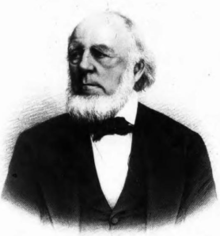John Appleton | |
|---|---|
 | |
| 6th Chief Justice of Maine | |
| In office October 24, 1862 – September 20, 1883 | |
| Appointed by | Governor Israel Washburn Jr. |
| Preceded by | John S. Tenney |
| Succeeded by | John A. Peters |
| Associate Justice of the Maine Supreme Judicial Court | |
| In office May 11, 1852 – October 24, 1862 | |
| Appointed by | Governor John Hubbard |
| Personal details | |
| Born | December 7, 1804 New Ipswich, New Hampshire, U.S. |
| Died | February 7, 1891 (aged 86) Bangor, Maine, U.S. |
| Resting place | Mt. Hope Cemetery, Bangor, Maine |
| Political party | Republican |
| Spouse |
Sarah Newcomb Appleton (née Allen)
(m. 1834; died 1874)Annie V. Appleton (née Greely)
(m. 1876) |
| Children | John • Frederic • Sarah • Henry • Edward |
| Parent(s) | John Appleton, Sr. Elizabeth Appleton (née Peabody) |
| Alma mater | Bowdoin College (B.A.)(M.A.) |
John Appleton (July 12, 1804 – February 7, 1891) was a prominent American legal reformer, jurist, and scholar in the fields of constitutional economics and classical liberalism.
Appleton is known for his jurisprudence in rules of evidence and individual rights, and was one of the first proponents of laissez-faire constitutionalism, decades before the doctrine was mainstreamed across the United States under the Lochner Court.[1][2][3][4] Appleton corresponded regularly with famous British philosopher John Stuart Mill and was considered very influential on his work.[5][6]
Appleton served as Chief Justice of the Maine Supreme Judicial Court from May 11, 1852, to September 19, 1883.[7] While on the bench, Appleton led the court to strike down a number of post-Civil War economic subsidies passed by the Maine Legislature and local governments. Appleton famously argued that state and local authorities had little to no authority in encouraging the movement of capital to stimulate economic growth.[2][8] Amongst his contemporaries, Appleton was also unusually sympathetic towards African-American equality.[9]
- ^ Bloomfield, Maxwell (September 1, 1991). "The Shaping of Nineteenth-Century Law: John Appleton and Responsible Individualism. By David M. Gold. (Westport: Greenwood, 1990. xvi + 229 pp. $42.95.)". Journal of American History. 78 (2): 670. doi:10.2307/2079590. ISSN 0021-8723. JSTOR 2079590.
- ^ a b Keynes, Edward (November 1, 2010). Liberty, Property, and Privacy: Toward a Jurisprudence of Substantive Due Process. Penn State Press. ISBN 978-0-271-04163-6.
- ^ "A VENERABLE JUDGE.; EX-CHIEF JUSTICE JOHN APPLETON, OF MAINE, IN THE EVENING OF LIFE". Retrieved April 27, 2020.
- ^ Lewis, William Draper (1908). Great American Lawyers: The Lives and Influence of Judges and Lawyers who Have Acquired Permanent National Reputation, and Have Developed the Jurisprudence of the United States : a History of the Legal Profession in America. John C. Winston Company.
- ^ Park, T. Peter (1991). "John Stuart Mill, Thomas Carlyle, and the U.S. Civil War". The Historian. 54 (1): 93–106. doi:10.1111/j.1540-6563.1991.tb00843.x. ISSN 0018-2370. JSTOR 24447935.
- ^ P, T. Peter (1991). "John Stuart Mill, Thomas Carlyle, and the U.s. Civil War". Historian. 54 (1): 93–106. doi:10.1111/j.1540-6563.1991.tb00843.x. ISSN 1540-6563.
- ^ "Cleaves Law Library | List of Justices of the Maine Supreme Judicial Court". cleaves.org. Retrieved April 19, 2020.
- ^ Rev. 1, Herbert Hovenkamp* 101 Iowa L. "Inventing the Classical Constitution". Iowa Law Review. Retrieved April 27, 2020.
{{cite web}}: CS1 maint: numeric names: authors list (link) - ^ Vile, John R. (2003). Great American Judges: An Encyclopedia. ABC-CLIO. ISBN 978-1-57607-989-8.